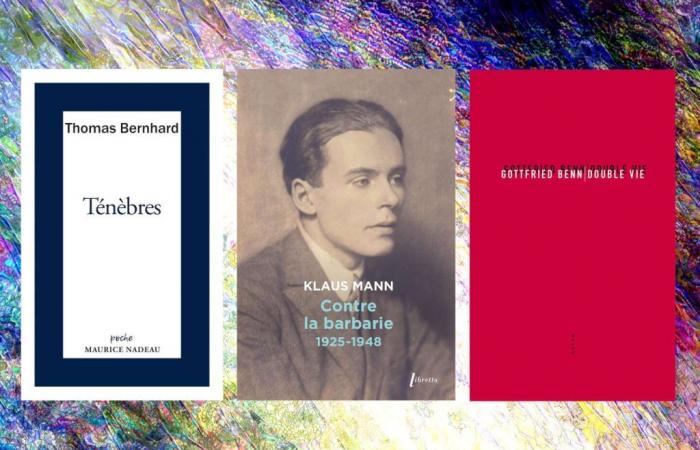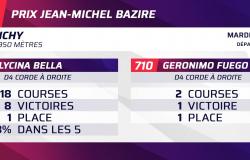“Darkness”, by Thomas Bernhard, translated from German (Austria) and presented by Claude Porcell, ed. Maurice Nadeau, “Poche”, 132 p., €9.90.
“Against Barbarism. 1925-1948”, by Klaus Mann, translated from German by Dominique Laure Miermont-Grente and Corinna Gepner, preface by Michel Crépu, Libretto, 448 p., €12.
“Double Lives” (Double Lives. Two Self-Portraits), by Gottfried Benn, translated from German by Alexandre Vialatte, edited by Jean-Michel Palmier, Allia, 224 p., 15 €.
We can never admire voluntarism enough and the naivety of the Federal Republic of Germany, Austrian industrialists and the city of Bremen, who, having insisted in the 1960s on crowning Thomas Bernhard (1931-1989), insisted that he embellish the presentation of his laurels with a few choice words. The result was as audacious as the world was: Bernhard thanked the world, but banished a mangy dog, like a salesman.
In Bremois, Bernhard launched, in 1965: “Life is nothing more than science, science drawn from science, we are suddenly dissolved in nature… Everything will be cold, with an ever more frightening cold.” Austrian industry will not wait in vain for 1967, receiving such invigorating remarks: “And it is by remembering that everything, in fact, has to do with death, that everything is death, all of life is nothing other than death, that I am going to wish you a good, even a memorable evening. » The German Minister of Culture will receive as viaticum: “We are populating a trauma…we already see, in the background, the giants of anguish.” In each line, Bernhard blocks the emergency exits, seals the windows, prohibiting any internal escape, any route of philosophical relief. With him, throughout the formidable collection of texts, speeches and interviews Darkness, the man chews on his death, whether in his autobiographical “Three Days” or in this long interview from 1979 which suddenly makes Samuel Beckett a chubby optimist. Thomas Bernhard or the“demolition contractor” (Bloy)…
“When I hear the word “culture”, I pull out my revolver! » To the famous reply, slightly modified by usage, of the piece Schlageter (1933), dedicated by the German Nazi playwright Hans Johst (1890-1978) to a hero of the nationalist cause, the reader of Against barbarism could retort without trembling: “…Me, when I hear the word “Nazi”, I draw my Klaus Mann [1906-1949] », tant Against barbarismcollection of articles by the eldest son of Thomas Mann, author of Mephisto a you Turning pointoffers, to the questions raised by the arrival in power of a dictatorial terrorist clique transformed into a mass party, all the themes and all the answers to the emergencies of the day.
You have 28.88% of this article left to read. The rest is reserved for subscribers.







